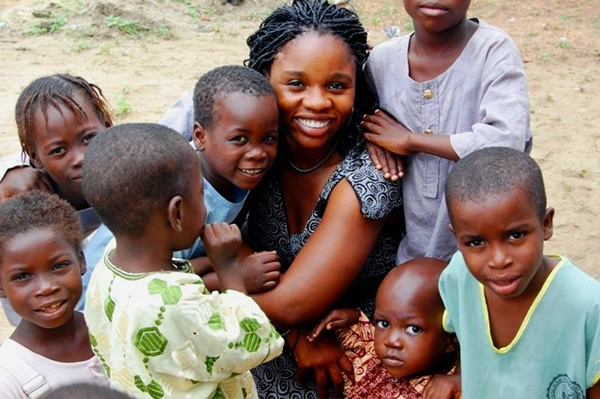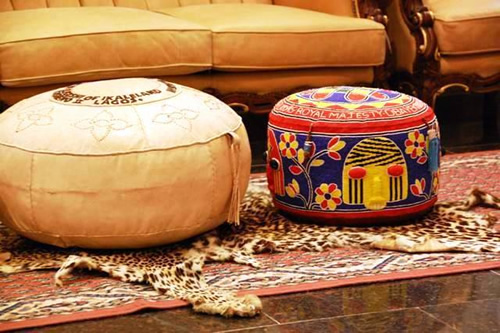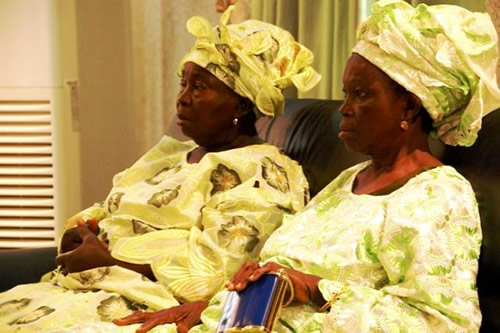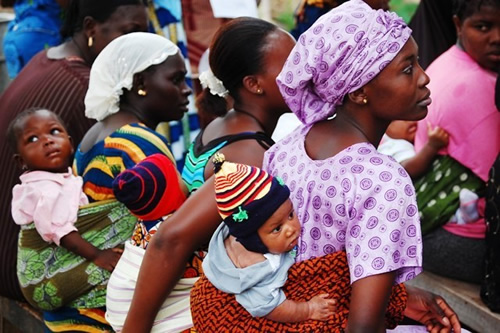How to Volunteer in Nigeria Effectively
The Key is Thinking Grassroots
Words and photographs by Lola Akinmade
 |
| Author with children of the Awoyaya community. |
We sat on white plastic chairs outside the small temple, waiting patiently as traditional worshippers recited their daily chants and prayers inside the dark room on a warm August summer morning.
Forty-five minutes later — once their devotions were over — the group filed quietly to the king’s palace about 200 feet away. More plastic chairs had been set up within the king’s living room to host a health education forum.
 |
| At the King's palace. |
The Nigerian-based grassroots nonprofit organization, Community Health Information Education Information Forum (CHIEF) had been invited to the small community of Elegushi by the Ikate Elegushi Queen’s Lion Club. The wives of the king were active members of this local division of the Lions International Club. The main discussion point on the agenda for the day was HIV/AIDS awareness. The goal was to delve into the epidemic of AIDS, debunk myths about its transmission, as well as educate the community about why stigmatizing members who carried the disease was destructive to society. It was decided that using terms and analogies in the local language, Yòrubá, would help to effectively communicate the message.
 |
| Aid worker at a forum organized at the King's palace. |
One common thread amongst all Nigeria’s 250+ tribes is a solid sense of community. Permeating tight-knit communities such as Elegushi — where traditional cultures and practices run deep — can be an unreceptive task. It takes a community to raise and educate children, share losses, and celebrate successes: Members of the Elegushi community worship together, eat together, and work together to strengthen their commune.
By their active participation, the king’s court and his wives wanted to send a clear message to its citizens; health education is vital to their long term sustenance. The ladies of the Lion Club were now peer educators, donning the cap of change agents within their community. By so doing, a two-to-three person organization can reach thousands by training peer educators within each community.
 |
| Matrons from the king's court listen at the forum. |
This is a glimpse into what thousands of small scale nonprofit organizations within Nigeria do on a daily basis.
Nigeria’s Global Image
Trying to shed an image as a country besieged by deep-seated corruption and semi-rogue regimes, it is no surprise that patrons and philanthropists are not always eager to send money directly to Nigeria.
Transportation challenges and unreliable infrastructure in several regions often make moving around the country as an independent traveler difficult.
Coupled with the recent surge of fraudulent emails, credit card scams, and an overtly aggressive cultural environment, the few rotten apples make it difficult for volunteers to donate time and resources to the people who truly need it. So volunteers flock over to East Africa where nations are less culturally aggressive and the infrastructure is a lot more reliable.
With a population pushing 190 million in a country twice the size of California, the need for volunteers is extremely crucial. A rampant shortage of adequate healthcare facilities and professionals has caused local hospitals and clinics to be stretched beyond capacity.
Sustained pressure is continually being placed on its road networks and infrastructure in an attempt to support an exponentially-growing population which is already half that of the entire United States.
A search on VolunteerAbroad.com yields only 14 listings for Nigeria, and over 208 listings for Kenya, even though Nigeria is Africa’s most populous nation.
Nigeria’s nationwide problems make the administration and distribution of aid from the top down very complex and difficult to implement. Volunteers are forced to dig deeper, targeting specific communities.
Getting Involved
 |
| Mothers attend a health education seminar. |
Within Nigeria, real change comes from the bottom up. Strong communities and villages work together to improve their lives without waiting on the government to send aid and assistance. Communities donate money to fix roads that would normally be the responsibility of a local government that has already been stretched thin trying to maintain other assets.
Even though aid is always needed in all facets of a society, when thinking of ways to volunteer in Nigeria, the main areas to consider are infrastructure projects, healthcare, specialized forms of education, and technology support.
Due to overwhelming overpopulation, these three key areas of support usually yield the most tangible returns from goodwill investment.
Once you have identified the capacity within which you’d like to volunteer, look for nonprofit organizations that are actively working on smaller community levels. Expecting money to trickle down effectively within an economy known for bottlenecks can be an audacious goal. Therefore, by directing your volunteer efforts towards grassroots movements you can get your aid closer to the people who need it.
Some Small-Scale NGOs operating in Nigeria
The Nigerian Network of NGOs (NNNGO) provides a comprehensive listing of registered small-scale NGOs, and is a great place to start in terms of looking for what types of organizations operate within the country while soliciting contact information for your entity of choice.
Other Options for Volunteering in Nigeria
If you are not ready or physically able to volunteer in Nigeria, there are various ways of sending donations and resources. We all wish we could get detailed accounts of how our donations are being allocated, but short of being on the ground in person, this can be an impossible task.
There are tons of large well-known nonprofit organizations such as UNICEF, Oxfam International, and the World Health Organization (WHO) currently operating in Nigeria as well. As with large scale organizations, their operating budgets can number in the millions of U.S. dollars.
If you are worried about your donations being gobbled up by administrative tasks which are inherently essential to some degree for the success of any organization, reach out to smaller-scale organizations with smaller areas of focus. By working with grassroots organizations that mobilize tiny communities to do great things, you can be much closer to the tangible results of those projects.
Regardless of how you choose to lend aid or volunteer your time and talents, every little gesture goes a long way.
Lola Akinmade's photography and travel writing have appeared in National Geographic, BBC, CNN, The Guardian, Travel + Leisure, Slate, Travel Channel, Lonely Planet, Forbes, Fodor’s, AFAR, National Geographic Channel, Adventure Magazine, several in-flight magazines, New York Times. Her work can be seen at www.lolaakinmade.com.
|
